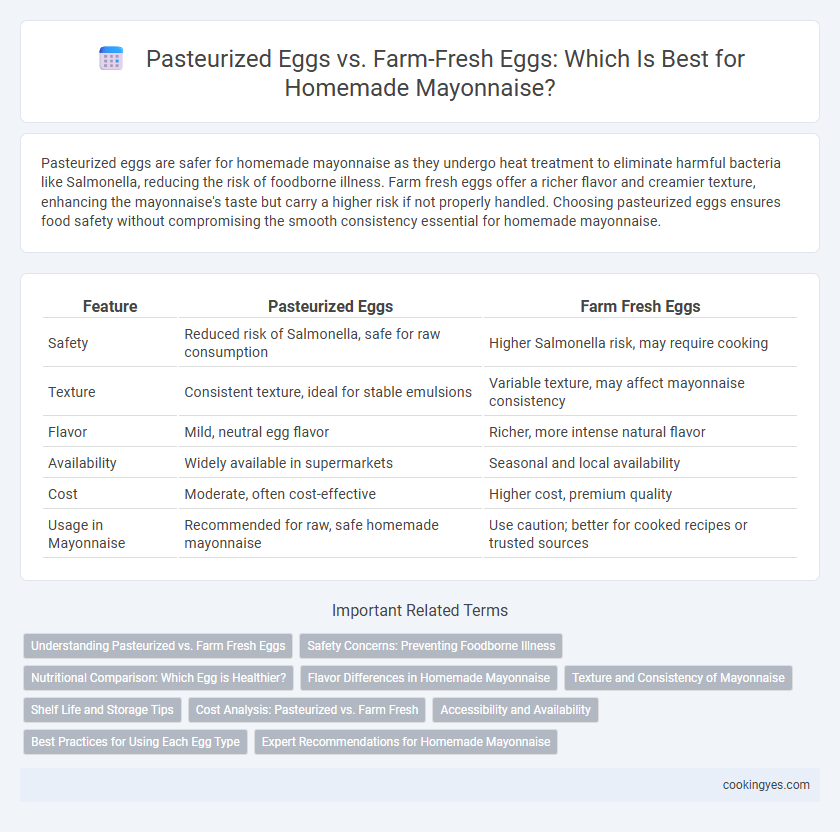Pasteurized eggs are safer for homemade mayonnaise as they undergo heat treatment to eliminate harmful bacteria like Salmonella, reducing the risk of foodborne illness. Farm fresh eggs offer a richer flavor and creamier texture, enhancing the mayonnaise's taste but carry a higher risk if not properly handled. Choosing pasteurized eggs ensures food safety without compromising the smooth consistency essential for homemade mayonnaise.
Table of Comparison
| Feature | Pasteurized Eggs | Farm Fresh Eggs |
|---|---|---|
| Safety | Reduced risk of Salmonella, safe for raw consumption | Higher Salmonella risk, may require cooking |
| Texture | Consistent texture, ideal for stable emulsions | Variable texture, may affect mayonnaise consistency |
| Flavor | Mild, neutral egg flavor | Richer, more intense natural flavor |
| Availability | Widely available in supermarkets | Seasonal and local availability |
| Cost | Moderate, often cost-effective | Higher cost, premium quality |
| Usage in Mayonnaise | Recommended for raw, safe homemade mayonnaise | Use caution; better for cooked recipes or trusted sources |
Understanding Pasteurized vs. Farm Fresh Eggs
Pasteurized eggs undergo a controlled heat treatment to eliminate harmful bacteria like Salmonella, making them safer for raw consumption in homemade mayonnaise. Farm fresh eggs, while prized for their rich flavor and vibrant yolks, carry a higher risk of bacterial contamination when used uncooked. Selecting pasteurized eggs reduces foodborne illness risk while maintaining the creamy texture essential for quality mayonnaise.
Safety Concerns: Preventing Foodborne Illness
Pasteurized eggs significantly reduce the risk of Salmonella contamination, making them safer for homemade mayonnaise where raw eggs are used. Farm fresh eggs, while often preferred for flavor and texture, carry a higher risk of harboring bacteria if not handled properly or sourced from reliable producers. Using pasteurized eggs ensures foodborne illness prevention without compromising the creamy texture essential for mayonnaise.
Nutritional Comparison: Which Egg is Healthier?
Pasteurized eggs offer a safer option for homemade mayonnaise as they undergo heat treatment to eliminate harmful bacteria without significantly altering nutrient content. Farm fresh eggs typically have higher levels of omega-3 fatty acids and vitamins A and E, contributing to better overall nutritional value. Choosing between pasteurized and farm fresh eggs depends on prioritizing food safety or maximizing nutrient intake.
Flavor Differences in Homemade Mayonnaise
Pasteurized eggs produce a safer homemade mayonnaise with a milder, less complex flavor compared to farm fresh eggs, which offer a richer, creamier taste due to their higher yolk-to-white ratio and natural fat content. The subtle flavor nuances in farm fresh eggs enhance the depth and subtle sweetness in mayonnaise, creating a more robust and flavorful dressing. Choosing farm fresh eggs results in a more authentic and vibrant homemade mayonnaise experience, favored by culinary enthusiasts seeking superior taste.
Texture and Consistency of Mayonnaise
Pasteurized eggs provide a smoother texture and more consistent emulsification in homemade mayonnaise due to their uniform quality and reduced risk of bacterial contamination. Farm fresh eggs often yield a richer flavor but can cause variability in texture and consistency because of fluctuating yolk quality and moisture content. Choosing pasteurized eggs enhances the stability and creaminess essential for perfect mayonnaise results.
Shelf Life and Storage Tips
Pasteurized eggs offer enhanced safety for homemade mayonnaise by reducing the risk of Salmonella contamination while extending shelf life up to 3 to 5 weeks when stored consistently below 40degF in the refrigerator. Farm fresh eggs, although favored for richer flavor, generally have a shorter shelf life of about 2 to 3 weeks and require prompt refrigeration to maintain freshness and prevent spoilage. To maximize safety and longevity, both egg types should be stored in their original cartons on a middle shelf inside the fridge, avoiding door storage where temperature fluctuates.
Cost Analysis: Pasteurized vs. Farm Fresh
Pasteurized eggs typically cost 20-30% more than farm fresh eggs due to the extra processing and safety measures involved. Farm fresh eggs, while cheaper, may carry a higher risk of bacterial contamination, impacting food safety for homemade mayonnaise. When balancing price with health considerations, pasteurized eggs offer a safer but more expensive option, whereas farm fresh eggs provide cost savings at potential risk.
Accessibility and Availability
Pasteurized eggs offer higher accessibility as they are widely available in most grocery stores year-round, ensuring consistent supply for homemade mayonnaise. Farm fresh eggs can be seasonal and vary by location, sometimes requiring visits to local farms or farmers' markets, which may limit availability. For reliable access and food safety, pasteurized eggs provide a practical alternative without sacrificing quality in homemade mayonnaise preparation.
Best Practices for Using Each Egg Type
Pasteurized eggs are safer for homemade mayonnaise due to their reduced risk of salmonella, making them ideal for recipes requiring raw or lightly cooked eggs. Farm fresh eggs, while richer in flavor and yolk color, should be used cautiously and thoroughly refrigerated, ideally from trusted sources with known hygiene standards to minimize contamination. To ensure best results, always whisk eggs at room temperature and incorporate acid like lemon juice or vinegar to stabilize the emulsion and enhance safety.
Expert Recommendations for Homemade Mayonnaise
Expert recommendations for homemade mayonnaise emphasize using pasteurized eggs to minimize the risk of Salmonella contamination, ensuring food safety while maintaining creamy texture. Farm fresh eggs, although prized for their rich flavor and natural yolk color, carry a higher bacteria risk if not properly handled or cooked. Pasteurized eggs provide a reliable balance between safety and quality, making them the preferred choice for experts when preparing raw egg-based mayonnaise at home.
Pasteurized eggs vs Farm fresh eggs for homemade mayonnaise Infographic

 cookingyes.com
cookingyes.com